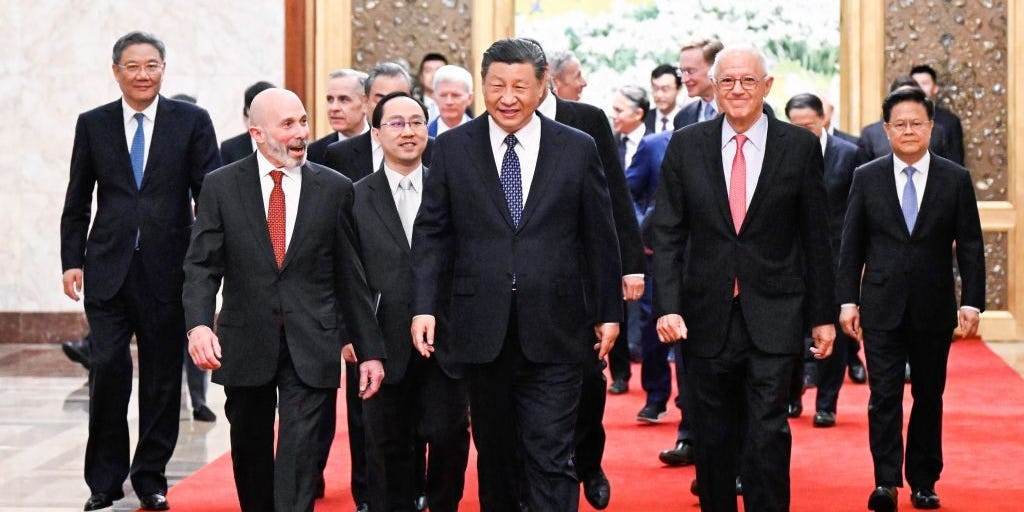- Xi Jinping on Wednesday was playing nice with US business leaders and academics on Wednesday.
- He’s seeking to boost China’s faltering economy.
- But Xi is also trying to dent US global power on several fronts.
China’s President Xi Jinping presented an uncharacteristically affable image Wednesday, smiling broadly for US business leaders at a meeting in Beijing.
The Chinese leader sought to assure investors including Cristiano Amon of Qualcomm and Stephen Schwarzman of the Blackstone Group that the downturn in China’s economy, its biggest contraction in 15 years, would be over soon.
He went on to paint a bright picture of future US-China relations, saying, according to the Xinhua state news agency.
“Whether it is traditional fields such as economy, trade and agriculture, or emerging fields such as climate change and artificial intelligence,” he said, “China and the United States should help boost each other’s development.”
Only weeks ago, Xi struck a very different tone.
This is the best summary I could come up with:
The Chinese leader sought to assure investors including Cristiano Amon of Qualcomm and Stephen Schwarzman of the Blackstone Group that the downturn in China’s economy, its biggest contraction in 15 years, would be over soon.
“Courting foreign investment is important for both objective and narrative purposes: China is trying to manage a challenging set of growth headwinds and signal that influential business leaders are still making a long-term bet on the country,” he said.
“In addition, while it is competing vigorously with the United States, it seeks to avoid a total rupture of relations with the world’s preeminent power; sustained engagement with the US business community is essential to that end.”
As part of his bid to smooth ties with the US and secure investment last November, Xi made a number of concessions to President Joe Biden, offering to help tackle fentanyl trafficking and work together on limiting the use of AI in nuclear weapons.
“It can bring some stability but not change the nature of a relationship that probably hasn’t found bottom yet,” said Robert Daly, director of the Wilson Center’s Kissinger Institute on China and the United States, speaking to NPR in November.
Underscoring the gap between Xi’s rhetoric Wednesday and reality, only days ago, the US and UK accused China of conducting an extensive and yearslong hacking campaign targetting businesses, politicians, and other public figures.
The original article contains 712 words, the summary contains 226 words. Saved 68%. I’m a bot and I’m open source!
I’ve noticed this happening. Am pleased to see an article written on the topic.
I think we’ve pretty conclusively shown that letting China into WTO has not had the intended effect. It absolutely never was going to, ask anyone who was at the Battle of Seattle - but now that we’ve tried it, maybe we should pick up the pieces.
Suits suck.
Good show, though.
Donating to the GOP has worked wonders for Russia.
I don’t think China is in such a bind. That’s not to say they don’t face any challenges. However, their interests just aren’t as contradictory as this article suggests.
China can undermine US power and attract US investors by continuing its rapid economic growth. That of course is not easy. They need to transition away from an economy based on large scale infrastructure development towards growth sectors such as green energy and high tech. They also need to develop better trade relationships with their international suppliers. As of right now it’s clear they’re trying to do both of those things and there are early signs of success.
That said, the US is aware that a more economically powerful China threatens the unique advantages US investors currently enjoy on the international stage. That’s why the US is specifically trying to undermine China’s trade relationships and sanction its high growth sectors.
Honestly though, I think the US is taking a huge risk here that could easily backfire. While sanctioning Chinese high tech might slow China’s growth in the short term, China developing its own independent supply chains may allow it to come back with a vengeance. Additionally, trying to cut China out of international trade deals may cause China to pursue more advantageous relationships that cut out the US entirely.
That’s an easy answer: Talk all kinds of shit for domestic consumption, while not doing a goddamned thing to change the absolute waterfall of dollars for you and your friends which is the status quo.
Like 50% of Arab leaders have been doing this to a T for about 50 years, and it generally works quite well for them.
There’s no bind here. Investors have no loyalty to any nation, they take their capital wherever they feel they can get the best return. They care only about themselves and their own financial interests. US investors do not care if US power is undermined. The US could collapse tomorrow and they would abandon the nation like rats fleeing a sinking ship.
I’m sure he could find a presidential candidate in the US he could donate money buying Bibles and social media stock.







